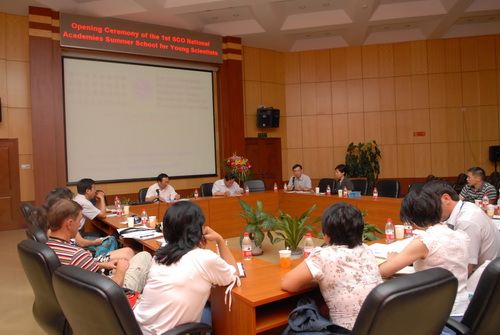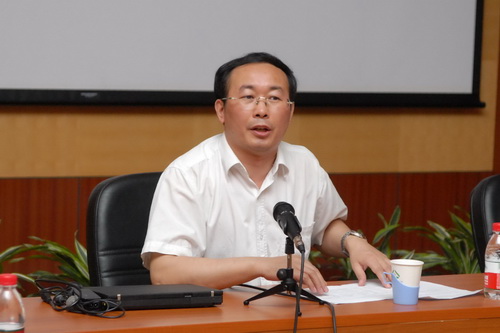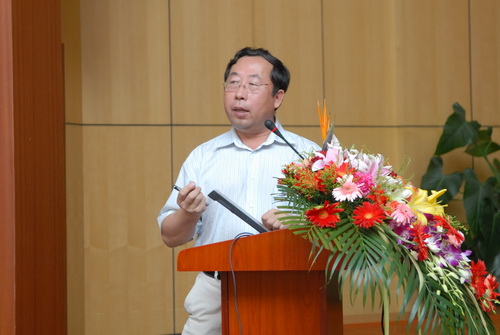
The opening ceremony of the "1st SCO National Academies Summer School for Young Scientists

Prof. LÜ Yonglong, Director of the International Cooperation Bureau, CAS
briefly introduced the background and significance of the summer school.

Prof. MA Keping, Director General of Institute of Botany, CAS gave a welcome speech
The opening ceremony of the "1st SCO National Academies Summer School for Young Scientists: Study of Grassland Ecosystem” was held in the Institute of Botany, Chinese Academy of Sciences on July 6, 2010. This summer school is sponsored by Chinese Academy of Sciences, and undertaken by Institute of Botany, CAS. Young scientists from national academies of Russia, Mongolia, Tajikistan, Kazakstan and Uzbekistan attend the summer school.
The opening ceremony was chaired by Prof. GE Song, deputy Director of the Institute of Botany, CAS. Prof. MA Keping, Director General of Institute of Botany, CAS gave a welcome speech and a brief introduction on the institute. Prof. LÜ Yonglong, Director of the International Cooperation Bureau, CAS briefly introduced the background and significance of the summer school, and warmly welcomed the participants to Beijing on behalf of Chinese Academy of Sciences. Irina Andreeval from Russia and Majid Gulayozov from Tajikistan gave short speeches as the representative of participants.
Chinese Academy of Sciences pays much attention to the communication and cooperation with neighboring countries. In recent years, CAS is committed to promoting the cooperation in science and technology among SCO countries. Initiated and promoted by the Chinese Academy of Sciences, the 1st and 2nd Forums of State Scientific Institutions of the Shanghai Cooperation Organization were successfully held in Urumchi, China, 2008 and Novosibirsk, Russia, 2009 respectively. Under the joint efforts of all parties, a number of substantive cooperation projects have been launched. Jiayang LI, vice president of Chinese Academy of Sciences, suggested to launch the summer school on the 2nd Forum, and promised that the Chinese Academy of Sciences would like to organize the first summer school.
Taking into account the same grassland ecological problems, such as grassland degradation, grassland management and biodiversity loss that SCO countries are facing, Chinese Academy of Sciences decided to entrust the Institute of Botany, CAS to undertake the 1st summer school, and the theme will be Study of Grassland Ecosystem. As a comprehensive research institute in Botany, Institute of Botany has made great achievements in grassland ecosystem and construction of field research stations.
With the aim of helping participants to gain a comprehensive understanding of what we have done and what we are doing on protecting the ecosystem in China, the summer school arranges a systematic and extensive professional training courses, with senior scientists of CAS being the teaching staffs. The 3-week program includes following courses: current development China’s modernization, ongoing work of China on the grassland ecosystem study. Site visits to typical research stations will also be organized for participants to better understand the grassland ecosystem research. In addition to these, participants will also have the opportunity to experience traditional Chinese culture and historical sites.

The opening ceremony of the "1st SCO National Academies Summer School for Young Scientists
Prof. LÜ Yonglong, Director of the International Cooperation Bureau, CAS
briefly introduced the background and significance of the summer school.
Prof. MA Keping, Director General of Institute of Botany, CAS gave a welcome speech
The opening ceremony of the "1st SCO National Academies Summer School for Young Scientists: Study of Grassland Ecosystem” was held in the Institute of Botany, Chinese Academy of Sciences on July 6, 2010. This summer school is sponsored by Chinese Academy of Sciences, and undertaken by Institute of Botany, CAS. Young scientists from national academies of Russia, Mongolia, Tajikistan, Kazakstan and Uzbekistan attend the summer school.
The opening ceremony was chaired by Prof. GE Song, deputy Director of the Institute of Botany, CAS. Prof. MA Keping, Director General of Institute of Botany, CAS gave a welcome speech and a brief introduction on the institute. Prof. LÜ Yonglong, Director of the International Cooperation Bureau, CAS briefly introduced the background and significance of the summer school, and warmly welcomed the participants to Beijing on behalf of Chinese Academy of Sciences. Irina Andreeval from Russia and Majid Gulayozov from Tajikistan gave short speeches as the representative of participants.
Chinese Academy of Sciences pays much attention to the communication and cooperation with neighboring countries. In recent years, CAS is committed to promoting the cooperation in science and technology among SCO countries. Initiated and promoted by the Chinese Academy of Sciences, the 1st and 2nd Forums of State Scientific Institutions of the Shanghai Cooperation Organization were successfully held in Urumchi, China, 2008 and Novosibirsk, Russia, 2009 respectively. Under the joint efforts of all parties, a number of substantive cooperation projects have been launched. Jiayang LI, vice president of Chinese Academy of Sciences, suggested to launch the summer school on the 2nd Forum, and promised that the Chinese Academy of Sciences would like to organize the first summer school.
Taking into account the same grassland ecological problems, such as grassland degradation, grassland management and biodiversity loss that SCO countries are facing, Chinese Academy of Sciences decided to entrust the Institute of Botany, CAS to undertake the 1st summer school, and the theme will be Study of Grassland Ecosystem. As a comprehensive research institute in Botany, Institute of Botany has made great achievements in grassland ecosystem and construction of field research stations.
With the aim of helping participants to gain a comprehensive understanding of what we have done and what we are doing on protecting the ecosystem in China, the summer school arranges a systematic and extensive professional training courses, with senior scientists of CAS being the teaching staffs. The 3-week program includes following courses: current development China’s modernization, ongoing work of China on the grassland ecosystem study. Site visits to typical research stations will also be organized for participants to better understand the grassland ecosystem research. In addition to these, participants will also have the opportunity to experience traditional Chinese culture and historical sites.
